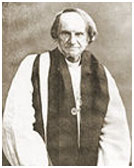
|
Christopher Wordsworth Hymns Written |
The Duke of Wellington said in 1827 of Dr. Wordsworth, the Master of Trinity College, "I consider him to be the happiest man in the kingdom"; and being asked why, the Duke answered, "Because each of his three sons has this year got a university prize!" Of the three, Christopher, the youngest, born in 1807, was the author of this hymn. He was athletic as well as scholarly, and liked to tell how he "caughtout Manning" (the future Cardinal) at a cricket match. His career at Winchester and at Cambridge University was one of extraordinary distinction, and at its close he re-mained as Fellow of Trinity College and assistant tutor.
Before he was thirty he was headmaster of a great school, Harrow. The fourteen years of his mastership there may be called also a part of his own education. He undertook a reformation of the school in manners and discipline with more earnestness than suavity; and though at the end of his anxious years there he left the school smaller than he found it, he took xvith him to a larger life new acquirements of tact and forbearance.
In 1844 Sir Robert Peel made him a Canon of Westminster Abbey. In that position he felt called upon to resist the appointment of Dr. Arthur Stanley as Dean with one of the "pamphlets" inevitable in English church controversy. Bitterly opposed as he was to the latitudinarianism for which Stanley stood, he tempered his earnestness with the courtesy he had learned at Harrow, and remained always on the best terms with the new Dean.
From 1850 for nineteen years Canon Wordsworth was pastor of a country charge, which had the striking name of Stanford-in-the-Vale-cum-Goosey. Here he lived except when on duty at the Abbey, and here he accomplished an enormous amount of scholarly work. He had already gained a high position as church-man and scholar, writer and preacher, when in 1869 Mr. Disraeli appointed him Bishop of Lincoln. His ad-ministration of this large diocese was both strenuous and successful until his strength failed in old age. He died on March 2 1 1885.
Christopher Wordsworth's fame as man of letters and bishop is greater than as a writer of hymns. The mass of his published work is very great and its quality very high. His earlier work was in the lines of classical study, and his book on Greece itself has obtained some-thing of the position of a "classic." But his two life-long enthusiasms were for "Church Principles" and Holy Scripture. And his literary work, covering much ground in both these departments, and far beyond them, culminated in his massive and learned Commentary on the Whole Bible.
He was a man of very decided opinions, which he liked to establish when he could, and at least to express when he could do no more. In church matters he was for strict and unbending adherence to the Church of England pattern. He could be cordial with his Methodist neighbors, but he could not agree that their ministers should wear the title "Rev." He bore his part in many a controversy, never looking to see which side was the popular one, but which was right. And if he struck stout blows for his somewhat narrow principles, it must also be said of him that he kept the friendship of his opponents. And that certainly is a good deal to say of him.
Bishop Wordsworth's opinions about hymns were just as decided as in other directions. He profoundly regretted that "Hymnology has been allowed to fall into the hands of persons who had little reverence for the Authority and Teaching of the ancient Christian Church, and little acquaintance with her Literature." "The consequence has been," he said, "that the popular Hymnology of this country has been too often disfigured by many compositions blemished by unsound doctrine, and even by familiar irreverence and rhapsodical fanaticism; or else it too often rambles on in desultory and unmeaning generalities, or sparkles with a glitter of tinsel imagery and verbal prettiness, or endeavors to charm the ear with a mere musical jingle of sweet sounds, not edifying the mind or warming the heart, nor ministering to the glory of Him to whom all Christian worship ought to be paid."
He thought, too, that our modern hymns were altogether too egotistical. They make too much of ourselves and our personal feelings, and not enough of God and His glory. He thought hymns of personal experience might do for private use. But for public use in church worship he did not approve of them. Church hymns should be churchly, expressing the worship of the congregation as a body and not as individuals. He would drop the pronouns "I" and "mine" from our hymns. We should forget ourselves and thank God for His great glory, and praise Him not for mercies to us as individuals, but to the whole company of faithful people. And especially he insisted that the great office and use of hymns was to set forth plainly and emphatically the teachings of the Scriptures and the Prayer Book. The hymns should teach the people the facts and doctrines of Christianity, and make "these glorious truths . . . the subject of public praise and thanksgiving to Almighty God." His idea was that the hymns for each day for which the Prayer Book provided services should set forth the meaning and lesson of that which the day commemorated.
(from "Studies In Familiar Hymns: First Series" by Dr. Louis Benson 1903)


